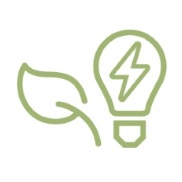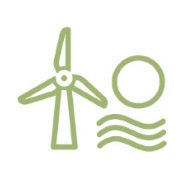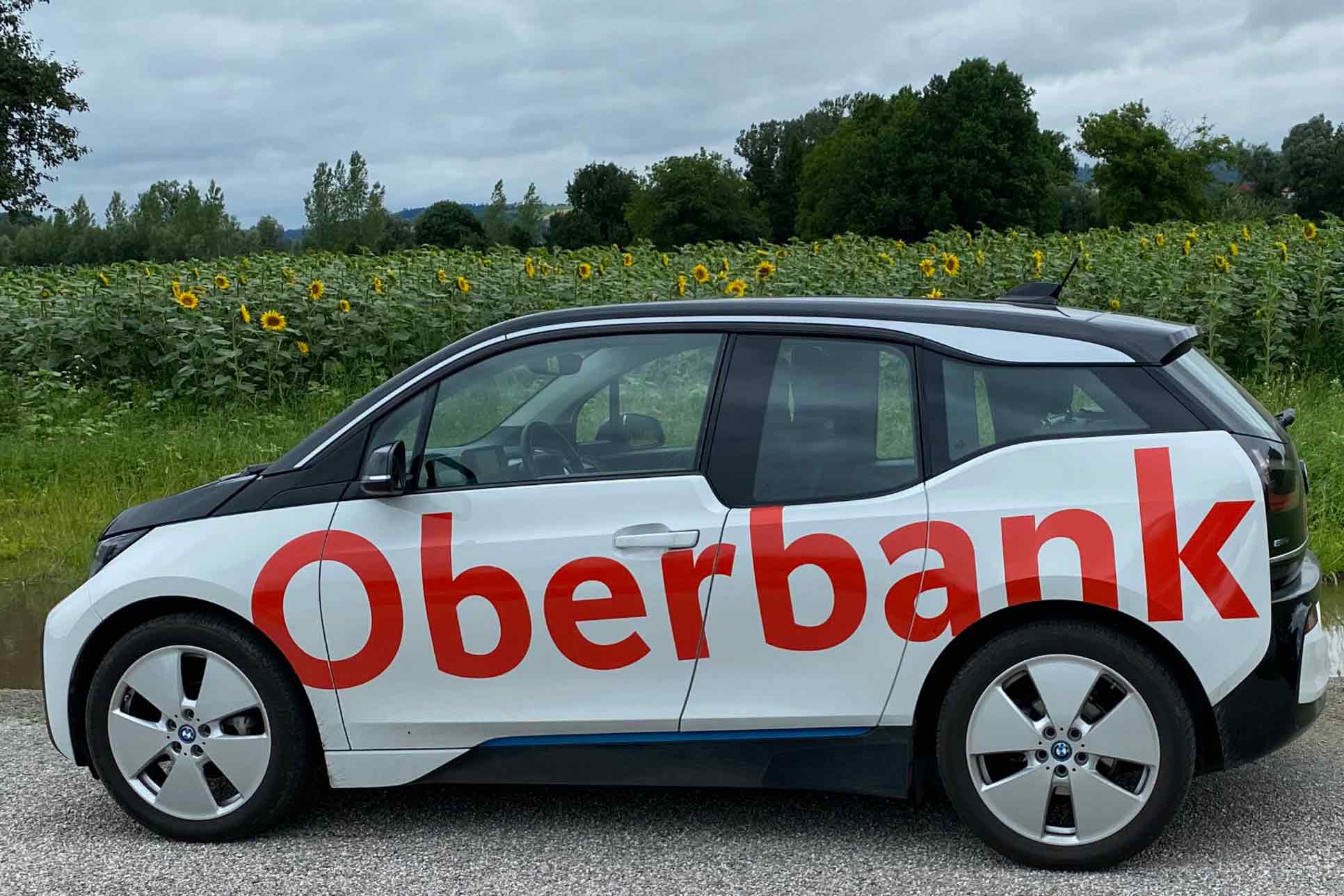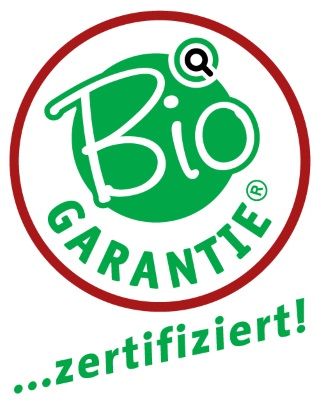Environmental & climate protection
Different, because:
we do not leave environmental protection to others, but assume responsibility ourselves.
Oberbank is expressly committed to taking ecological and social aspects into account in all its deliberations. In the banking sector in particular, principles such as frugality, reliability and soundness have proven to be values that must be handled with special care, because the trust of customers, employees and other social groups is of utmost importance.
Decarbonisation and CO₂ footprint
Greenhouse gas emissions according to the Green House Gas Protocol
According to the Green House Gas Protocol (GHG Protocol), greenhouse gas emissions can be categorised into three different impact areas.
- Direct emissions, also known asscope 1 emissions, occur directly at the company (for example through its own vehicle fleet).
- Scope 2 emissions are upstream emissions that occur in the course of providing energy to the company (for example, through purchased energy)
- Scope 3 emissions are indirect emissions that occur along the value chain through upstream emissions (such as employee mobility) and downstream emissions. The most relevant portion of scope 3 emissions for the bank are the emissions resulting from the loans and investments made by the bank.
Measures to reduce direct and indirect greenhouse gas emissions
Scope 1
Increase e-mobility: increased purchase of e-cars.
Scope 2
Evaluation of the conversion to green electricity in all Oberbank markets (AT/DE/CZ).
Scope 3
Financed emissions: Development of a decarbonization strategy targets.
Emissions in our own operations:
The goal to reduce the carbon footprint in Scope 1 (emissions – fossil fuels, vehicle fleet) and Scope 2 (energy purchases – electricity, steam, heating, cooling) to under a ton of CO2 equivalents per employee by 2025 was achieved in 2024.
Oberbank has taken the following measures:
Energy efficiency

Increasing energy efficiency through space management (location analyses, consolidations, reductions); modernisation, new working models, processes; increasing the efficiency of the self-service areas in the branches; efficient cooling of the technical rooms, elimination of servers in the branches.systems, heating and advertising elements.
Green electricity

Purchase of electricity from renewable sources; in Austria and Germany, Oberbank has been using 100 percent green electricity since 2020, and in CZ since 2021.
Renewable energy

Shift away from oil and gas; investment in new installations (photovoltaics, e-mobility) By the end of 2024, 16 PV systems are in operation.
Target for e-mobility: The share of electric/hybrid vehicles is to be increased to 30 percent by 2025 and to 50 percent by 2030. By the end of 2024, 66 electric vehicles and 4 hybrid vehicles were already in use in the fleet. This represents 22.50% of the total fleet across all Oberbank markets.
Indirect greenhouse gas emissions: scope 3
Since 2022, we have been collecting data on indirect greenhouse gas emissions that occur along the value chain (scope 3 emissions).
Employee mobility
This includes business travel and commuting (employees travelling to and from work). With the exception of the company's own vehicle fleet, the CO₂ emissions generated in the process are classified as scope 3.
Since 2022 a mobility survey is conducted across all Oberbank Group locations in Austria, Germany, Slovakia, Hungary and the Czech Republic. Based on the results, the CO₂ emissions generated by mobility are calculated in emitted tonnes of carbon dioxide equivalents (CO₂ in t).
The emissions for commuting to work correspond to the emissions caused by the electricity consumption of around 1,249 households.
The emissions for business travel correspond to the emissions caused by the electricity consumption of around 345 households.
Financed emissions
Oberbank AG has been a member of the Partnership for Carbon Accounting Financials (PCAF) since October 2021. The PCAF methodology allows for a globally standardised calculation and disclosure of greenhouse gas emissions resulting from financing and investments. These greenhouse gas emissions are categorised as scope 3 category 15 (according to GHG Protocol)
The financed emissions were calculated for the following asset classes:
- Listed equity and corporate bonds
- Business loans and unlisted equity
- Mortgages
- Commercial real estate
-
Sovereign debt
-
Project finance
For further information on the results as well as the applied methodology please view the sustainability report in brief
Decarbonisation
Oberbank started the development of a decarbonization strategy for its entire portfolio in 2023. In this context, Oberbank has committed itself to the Science Based Targets Initiative (SBTi) and thus to the calculation and submission of climate protection targets for the year 2030. However, the achievement of such decarbonization targets is always strongly dependent on external factors such as political framework conditions, economic factors or the level of ambition of the borrowers. It is therefore possible that targets will be missed despite intensive efforts if, for example, macroeconomic assumptions do not materialize.
In light of this and after a detailed examination of the SBTi methodology for financial institutions and the decarbonization targets resulting from this target-setting methodology for Oberbank, it was therefore decided in the course of 2024 to take distance from SBTi.
Despite turning away from SBTi, decarbonization targets are to be set for the vast majority of the loan portfolio in the course of 2025 and written down in a decarbonization strategy with appropriate measures. The decarbonization strategy is a central building block for Oberbank on its way to making a measurable contribution to achieving the Paris climate targets and meeting the regulator's requirements.
In 2024, an initial sector-specific climate protection target was formulated for the commercial real estate portfolio by 2030 (see table below). The target is based on the decarbonization scenarios of the CRREM (Carbon Risk Real Estate Monitor) project and is provisionally defined as a target corridor.
For further details please see sustainability report 2024
The Eco Management and Audit Scheme EMAS
Further improvement of sustainability within our own operations:
The Eco-Management and Audit Scheme (EMAS) is a voluntary tool for any company that wants to improve the environmental performance of its operations and is a significant extension of the environmental management system according to ISO 140001. Following an audit by an accredited body, Oberbank has been certified under EMAS as of December 2022.The implementation of the regulation is reviewed once a year by an external audit, which was also successfully completed in 2024.
In addition to an even stronger focus on environmental aspects, the EMAS assessment is further proof of our commitment. By publishing the environmental statement featuring detailed information on the environmental impacts, targets and key figures, we are taking another step towards transparency with regard to our progress in sustainability management.
Resource conservation in mobility, internal processes and procurement
The careful use of all resources is part of our responsibility. This is why Oberbank strives to achieve the highest possible environmental compatibility in all its activities, processes and products.

Video conferences reduce CO₂ emissions
Business trips should also be carried out in a climate-friendly manner. To this end, Oberbank has included the primacy of public transport – primarily rail – in its business travel guidelines. Only if this is uneconomical, unreasonable or impracticable in individual cases may another means of travel be used. Our business partner is the Austrian Federal Railways (ÖBB). The number of business trips was also significantly reduced by setting up video conference rooms and promoting video conferencing.
To ensure that Oberbank employees can get from A to B in the most environmentally friendly way possible, even on business trips that cannot be made by public transport, we have been increasingly using e-mobility since 2018. The share of electric/hybrid vehicles is to be increased to 30 percent by 2025 and to 50 percent by 2030.
Oberbank is implementing several measures to optimise its internal processes and, at the same time, to improve the environmental footprint of its day-to-day business operations. The main focus in this context is on reducing paper consumption and lowering CO₂ emissions. Among other things, we achieve this by reducing the number of courier trips between the head office in Linz and our branches, as well as by digitising various forms and promoting electronic signatures.
When selecting suppliers, Oberbank takes ecological and social impacts into account as far as possible (e.g. purchase of recycled paper and paper towels; award of contracts to regional suppliers wherever possible, etc.). In addition to the general Code of Conduct for employees, Oberbank also has a Code of Conduct for suppliers and business partners, which extends the rules and measures mentioned in the Code of Conduct to the collaboration with external partners. All suppliers of Oberbank AG must comply with these principles, which include compliance with the law, respect for human rights, various environmental regulations and the prohibition of corruption and bribery.
Furthermore, when it comes to selecting suppliers, the company kitchen at the head office in Linz has already switched to organic products in numerous product groups, for which an organic certificate was awarded.

In our procurement policy, we are committed to purchasing IT equipment in an environmentally friendly and resource-saving manner. Our hardware is purchased in compliance with Energy Star, Blue Angel and The Eco Declaration. At the end of the equipment’s life cycle, it is either disposed of properly or passed on to families or institutions in need, such as Future for Children or public educational institutions.
The Oberbank Donau-Forum (event centre at the Oberbank headquarters in Linz) is certified with the Austrian „Green Location“| UZ 200 Ecolabel. Oberbank thereby seeks to demonstrate its high quality standards and, at the same time, sets an example for sustainabilty. With the eco-label it undertakes to comply with strict criteria and to have ourselves monitored by independent bodies. In addition, we implement measures such as, to name a few, purchasing regional and organic products, sensible use of energy and water, the reduction of CO₂ emissions, avoidance and separation of waste, training our employees on all matters, preservation of natural diversity and cultural heritage, promotion of the regional economy.

Practising sustainability with our “Honey Stock”
Since April 2018, four beehives have found a home on the terrace of the new Oberbank building. Since then, over 160.000 bees have been swarming out into the area near the Danube banks and the neighbouring grasslands. The honey bee is a species worthy of protection and makes an essential contribution to the well-being of humans and nature. Our “Honey Stock” is an important investment in the future, as the honey bee population is endangered, although bees ensure lower pesticide exposure and higher flower diversity. Oberbank deliberately supports the trend towards locating more and more bee colonies in urban areas.
The first honey was collected as early as June 2018. Together with the beekeeper in charge of the bee colonies, two employees extracted more than 100 kg of pure Oberbank honey. Honeyland Upper Austria tested the honey and awarded it the “GOLDEN Blossom Honey Quality Seal” certificate.
Another initiative to protect bees is our “Feed the Bees” campaign. Every time we open an Oberbank be(e) green account, we make a joint contribution to the preservation of the bee population by creating large-scale flower meadows, thereby providing a habitat for bees and other flower-pollinating insects.
To the “Feed the Bees” initiative
Employees
We are heading towards a more sustainable future together with our employees.
Society
Oberbank can only be economically successful if it also assumes its social responsibility.
Strategy & guidelines
Oberbank's strategy is based on ethical and ecological values.
Ratings & memberships
Oberbank makes a measurable contribution to sustainable development.